American Colonies - Spanish America (original) (raw)
| Spanish Colonies in the Americas (Spanish Empire) AD 1492 - 1898 The four transatlantic voyages to the Americas which were undertaken by Christopher Columbus between 1492-1500 opened up what was known as the 'New World' to exploitation and colonisation by the states of Western Europe. He is known even to this day as the 'discoverer' of the New World despite confirmation that Leif Erikson's Vikings had already established the short-lived Vinland colony in Newfoundland around AD 1000, and despite the fact that people had been living in the 'newly discovered' world since about 40,000-25,000 BC. In fact Columbus was piecing together accounts by many other sailors in regard to Atlantic currents and the strange lands which may have lain at the other end of them, although no one seems to have discovered how to make best use of the prevailing currents and winds. Columbus started this work before first seeking sponsorship in 1484. The eventual sponsor he did find for his voyages was the soon-to-be united throne of Spain, still energetic and enthusiastic for conquest after terminating the final Muslim state in Iberia itself. The growing might of the Ottoman empire was closing off access routes to the east, so a new route was needed: to the west. Columbus first landed in the Bahamas on 12 October 1492, thinking all the time that he had reached [ China](../KingListsFarEast/ChinaDynastiesOld.htm#Ming Dynasty) or [ Japan](../KingListsFarEast/JapanDynastiesOld.htm#Muromachi Period). This was due to his apparent miscalculations of distance which had resulted in him placing Japan on the globe in the region of the West Indies. Even so, he began a process of colonisation and empire-building on the part of Spain. On 28 October he made landfall on Cuba and, by 5 December 1492, he had reached western Hispaniola (modern Dominican Republic and Haiti), where he founded the colony of La Navidad and became its first viceroy. Subsequent explorations by Columbus and others, coupled with the conquest of the Aztec and Inca empires, led to the creation of an enormous Spanish empire in the western hemisphere which ultimately stretched from modern Oregon to Tierra del Fuego. Vast riches in gold and silver poured into a now-united Spain, making it one of the major European powers in the sixteenth and seventeenth centuries. From there, however, Spain began a long and slow decline which affected its hold over its overseas empire. In the latter part of the eighteenth and nineteenth centuries revolutionary fervour swept the world. The United States of America formed out of part of the British Colonies in the Americas, Haiti threw off its imperial [ French](../KingListsEurope/FranceFranks.htm#First Empire) rulers, and Spain itself was conquered by Napoleon Bonaparte in 1808, weakening the bonds between the mother country and its colonies. In 1810, New Spain saw unsuccessful insurrections in Mexico and [ Cuba](CentralCuba.htm#Captaincy General), but later rebellions would lead to the full independence of almost all of Spain's New World colonies. The very last vestiges of the Spanish empire were finally eliminated in 1898 with defeat in the Spanish-American War. |
|---|
 |
| (Information by Peter Kessler and John De Cleene, with additional information from Discovering the Chichimeca, Charlotte M Gradie (The Americas, Vol 51, No 1:67-88, 1994), from Codex Chimalpahin Vol 1: Society and Politics in Mexico Tenochtitlan, Tlatelolco, Texcoco, Culhuacan, and Other Nahua Altepetl in Central Mexico, concerning the writings of seventeenth century Nahua historian Chimalpahin Cuauhtlehuanitzin, otherwise known as Don Domingo Francisco de Antón Muñón, (Eds) Arthur J O Anderson, Susan Schroeder, & Wayne Ruwet (1997), from The New Islamic Dynasties: A Chronological and Genealogical Manual, C E Bosworth (2004), from Enciclopedia de México, Bernardo de Gálvez (Mexico City, 1987, in Spanish), and from External Links: Encyclopaedia Britannica, and Conquistadors sacrificed and eaten by Aztec-era people (The Guardian).) |
 |
| | |
| ----------------------------------------------------------------------------------------------------------------------------------------------------------------------------------------------------------------------------------------------------------------------------------------------------------------------------------------------------------------------------------------------------------------------------------------------------------------------------------------------------------------------------------------------------------------------------------------------------------------------------------------------------------------------------------------------------------------------------------------------------------------------------------------------------------------------------------------------------------------------------------------------------------------------------------------------------------------------------------------------------------------------------------------------------------------------------------------------------------------------------------------------------------------------------------------------------------------------------------------------------------------------------------------------------------------------------------------------------------------------------------------------------------------------------------------------------------------------------------------------------------------------------------------------------------------------------------------------------------------------------------------------------------------------------------------------------------------------------------------------------------------------------------------------------------------------------------------------------------------------------------------------------------------------------------------------------------------------------------------------------------------------------------------------------------------------------------------------------------------------------------------------------------------------------------------------------------------------------------------------------------------------------------------------------------------------------------------------------------------------------------------------------------------------------------------------------------------------------------------------------------------------------------------------------------------------------------------------------------------------------------------------------------------------------------------------------------------------------------------------------------------------------------------------------------------------------------------------------------------------------------------------------------------------------------------------------------------------------------------------------------------------------------------------------------------------------------------------------------------------------------------------------------------------------------------------------------------------------------------------------------------------------------------------------------------------------------------------------------------------------------------------------------------------------------------------------------------------------------------------------------------------------------------------------------------------------------------------------------------------------------------------------------------------------------------------------------------------------------------------------------------------------------------------------------------------------------------------------------------------------------------------------------------------------------------------------------------------------------------------------------------------------------------------------------------------------------------------------------------------------------------------------------------------------------------------------------------------------------------------------------------------------------------------------------------------------------------------------------------------------------------------------------------------------------------------------------------------------------------------------------------------------------------------------------------------------------------------------------------------------------------------------------------------------------------------------------------------------------------------------------------------------------------------------------------------------------------------------------------------------------------------------------------------------------------------------------------------------------------------------------------------------------------------------------------------------------------------------------------------------------------------------------------------------------------------------------------------------------------------------------------------------------------------------------------------------------------------------------------------------------------------------------------------------------------------------------------------------------------------------------------------------------------------------------------------------------------------------------------------------------------------------------------------------------------------------------------------------------------------------------------------------------------------------------------------------------------------------------- |
| KING LIST INDEX |
| 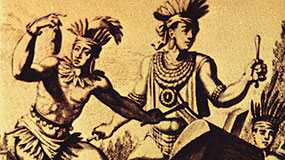 Hispaniola (AD 1492) By 5 December 1492, Columbus had arrived at western Hispaniola, where he founded the colony of La Navidad and became its first viceroy before he sailed to eastern Cuba.
Hispaniola (AD 1492) By 5 December 1492, Columbus had arrived at western Hispaniola, where he founded the colony of La Navidad and became its first viceroy before he sailed to eastern Cuba. 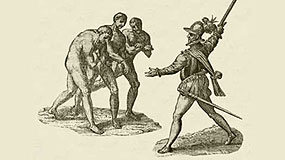 Santa Maria de Belen (AD 1503) Native tribes attacked this small outpost and its eighty-man garrison, forcing it to retreat to the shore where it was eventually rescued, the outpost permanently abandoned.
Santa Maria de Belen (AD 1503) Native tribes attacked this small outpost and its eighty-man garrison, forcing it to retreat to the shore where it was eventually rescued, the outpost permanently abandoned. 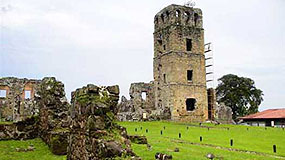 Panama (AD 1508) Panama was occupied for a second time, now on a permanent basis after the de Belen failure, in 1519 when Panama City was founded, initially to be administered as part of Peru.
Panama (AD 1508) Panama was occupied for a second time, now on a permanent basis after the de Belen failure, in 1519 when Panama City was founded, initially to be administered as part of Peru.  Puerto Rico (AD 1509) Juan Ponce de Leon was sent out to conquer the island of Puerto Rico in 1506 after finding gold there and desiring greatly to search for more - he eventually made his fortune.
Puerto Rico (AD 1509) Juan Ponce de Leon was sent out to conquer the island of Puerto Rico in 1506 after finding gold there and desiring greatly to search for more - he eventually made his fortune. 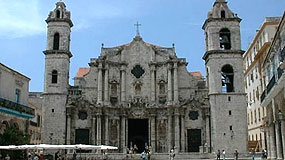 Cuba (AD 1510) Diego Velazquez de Cuellar, aide to the governor of Hispaniola, completed the colonial conquest of Cuba, following which he was made the first governor of the island in 1511.
Cuba (AD 1510) Diego Velazquez de Cuellar, aide to the governor of Hispaniola, completed the colonial conquest of Cuba, following which he was made the first governor of the island in 1511. 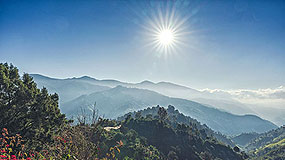 Jamaica (AD 1510) Spanish explorers Juan Diaz de Solis and Vicente Yanez Pinzon sailed past the northern coast of Jamaica in 1505, but it took another five years before the island became a Spanish colony.
Jamaica (AD 1510) Spanish explorers Juan Diaz de Solis and Vicente Yanez Pinzon sailed past the northern coast of Jamaica in 1505, but it took another five years before the island became a Spanish colony. 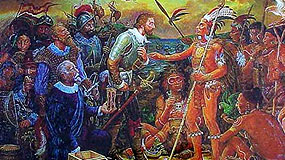 Florida (AD 1514) The Spanish explorer Juan Ponce de Leon was the first Spaniard to reach Florida after he aided in the conquest of Puerto Rico, but it took until 1565 for a permanent colony could be established.
Florida (AD 1514) The Spanish explorer Juan Ponce de Leon was the first Spaniard to reach Florida after he aided in the conquest of Puerto Rico, but it took until 1565 for a permanent colony could be established. 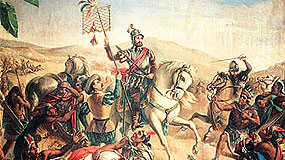 Mexico City (AD 1521) Following the destruction of the Aztec empire by Conquistador Hernan Cortes, a series of Latinised members of the previous ruling elite were appointed to govern the outer sections of Mexico City.
Mexico City (AD 1521) Following the destruction of the Aztec empire by Conquistador Hernan Cortes, a series of Latinised members of the previous ruling elite were appointed to govern the outer sections of Mexico City. 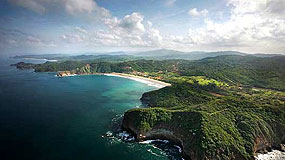 Nicaragua (AD 1524) From his base at the new colonial capital of Mexico City, Conquistador Pedro de Alvarado explored and conquered territory to its south between 1523-1527, with Nicaragua becoming a province in 1524.
Nicaragua (AD 1524) From his base at the new colonial capital of Mexico City, Conquistador Pedro de Alvarado explored and conquered territory to its south between 1523-1527, with Nicaragua becoming a province in 1524. 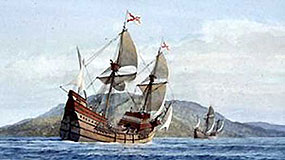 Honduras (AD 1526) The colony of Honduras was first claimed for Spain on 30 July 1502, but settlement did not officially begin until 3 May 1524, after which it was administered under the Spanish colony of New Spain.
Honduras (AD 1526) The colony of Honduras was first claimed for Spain on 30 July 1502, but settlement did not officially begin until 3 May 1524, after which it was administered under the Spanish colony of New Spain. 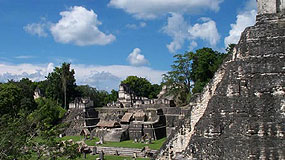 Guatemala (AD 1527) Pedro de Alvarado was sent out by Hernan Cortes at Tenochtitlan to conquer the highlands of Guatemala, so he first targetted the Quiche people and then his early allies, the Cakchique.
Guatemala (AD 1527) Pedro de Alvarado was sent out by Hernan Cortes at Tenochtitlan to conquer the highlands of Guatemala, so he first targetted the Quiche people and then his early allies, the Cakchique. 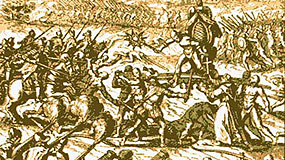 Peru (AD 1528) The fifth expedition to conquer Peru, led by Francisco Pizarro, headed out in 1532 with - at last - a chance of success, although the office of governor had already been set up in 1528.
Peru (AD 1528) The fifth expedition to conquer Peru, led by Francisco Pizarro, headed out in 1532 with - at last - a chance of success, although the office of governor had already been set up in 1528. 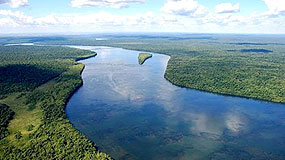 New Andalusia (AD 1534) Pedro de Mendoza offered to explore South America at his own expense in 1529, intending to found colonies there, and in 1534 his offer was accepted and he was made the first governor of New Andalusia.
New Andalusia (AD 1534) Pedro de Mendoza offered to explore South America at his own expense in 1529, intending to found colonies there, and in 1534 his offer was accepted and he was made the first governor of New Andalusia. 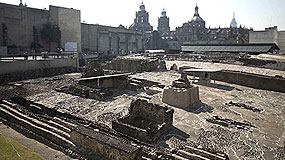 New Spain (AD 1535) The process of establishing the viceroyalty of New Spain was completed in 1535, replacing the 'Council of the Indies' which itself had been created to negate the chance of breakaway kingdoms being formed.
New Spain (AD 1535) The process of establishing the viceroyalty of New Spain was completed in 1535, replacing the 'Council of the Indies' which itself had been created to negate the chance of breakaway kingdoms being formed. 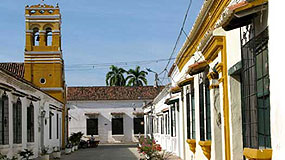 New Granada (AD 1538) The 'New Kingdom of Granada' (as opposed to the old kingdom of Granada in Spain) was created to encompass almost all of the territories of Central America to the south of Mexico.
New Granada (AD 1538) The 'New Kingdom of Granada' (as opposed to the old kingdom of Granada in Spain) was created to encompass almost all of the territories of Central America to the south of Mexico. 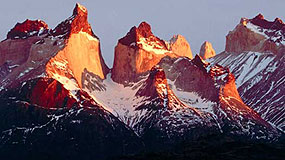 Realm of Chile (AD 1540) Chile proved a difficult place to reach quickly but, in 1540, the 'Realm of Chile' was officially created as an administrative division of the viceroyalty of Peru, managed through local governors.
Realm of Chile (AD 1540) Chile proved a difficult place to reach quickly but, in 1540, the 'Realm of Chile' was officially created as an administrative division of the viceroyalty of Peru, managed through local governors.  Tlatelolco (AD 1549) The Spanish did not have it entirely their way during the initial conquest of the Aztec empire, and it was Cortes who recorded the capture by natives of a Spanish convoy in 1520. |
| |
Tlatelolco (AD 1549) The Spanish did not have it entirely their way during the initial conquest of the Aztec empire, and it was Cortes who recorded the capture by natives of a Spanish convoy in 1520. |
| |